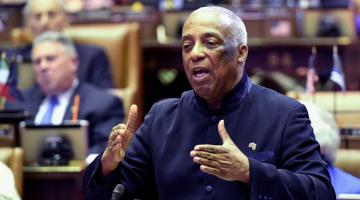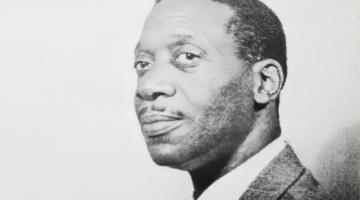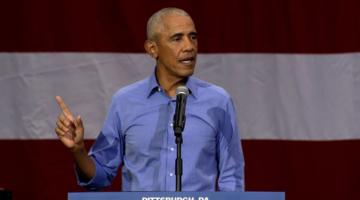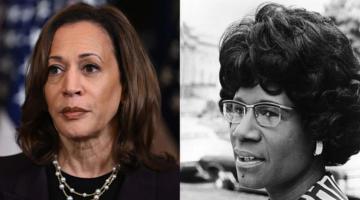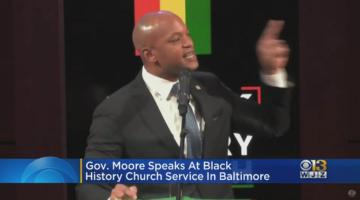O.J. Simpson with his attorneys Johnnie Cochran and Robert Blasier during his murder trial.
O.J. Simpson's acquittal in one of the most infamous murder trials of the 20th century was celebrated as a symbolic win for the Black community against an oppressive system. However, O.J. was undeserving of such jubiliation.
If a Black man, who denies being Black, beats the system, did Black people beat the system?
That is the question that came to mind when I heard of the death of O.J. Simpson, who was charged with double homicide in the murder of his former wife Nicole Brown Simpson, and Ron Goldman in 1994. The standard hindsight reflections about Simpson tend to conflate the player with the person which I think is a mistake for anyone attempting to understand, not so much Simpson as a person, but the surroundings he chose and the American Exceptionalism he felt entitled to enjoy.
First of all, as a player, Simpson was one of the five best running backs in the history of football. Just consider his 1973 Most Valuable Player campaign during which he became the first to rush for over 2000 yards in a season which at that time was only 14 games. He also averaged 6 yards per carry that year. For context, an average of 4 yards is considered outstanding. That year, the starting quarterback for his team only threw 4 touchdown passes which shows that defenses were not concerned about their passing game. They knew Simpson was getting the ball and he still was unstoppable! Two years later he would rush for over 1800 yards in what was still only a 14-game season on his way to rushing for over 1,000 for his career and scoring 75 touchdowns. He would be elected, deservedly so, to the Pro Football Hall of Fame in his first year of eligibility.
If we discuss O.J. Simpson as a person, inevitably we must address the double murder charges in 1994. Obviously, that is relevant but understanding the politics of his position as a Black celebrity requires one to investigate further.
In 1967, Simpson would lead the University of Southern California Trojans to the National Title in college football. The Olympics were held in the summer of 1968 in Mexico City. This was barely two months after the assassination of Martin Luther King. To say it was a tumultuous time in the United States would be an understatement. Olympic officials were very aware of this and issued warnings to the athletes that no form of political protest would be tolerated. Enter a young sociologist named Harry Edwards who helped to organize a protest statement through track stars John Carlos and Tommy Smith both of whom would give the Black power salute on the winner’s podium after receiving their medals for the world to see. That fall, Simpson would win the prestigious Heisman Trophy which, at least in theory, goes to the best player in college football. In addition, Edwards challenged O.J. on the issue of Black athlete activism to which O.J. infamously replied, “I’m not Black, and I’m O.J.”
It is possible that Simpson observed the treatment of Carlos and Smith who were blackballed for years after their courageous act, and consciously made what was essentially a business decision to avoid any expressions of Black radical actions. It is possible that he was simply afraid. He may have been honest in his announcement that he did not see himself as a Black person. Regardless of motives, O.J. was clear that he wanted no obligation to “Blackness” be it political, social, or cultural. For the next 25 years or so, from a purely material standpoint, life was good for O.J.. He was one of the broadcasters on the popular series Monday Night Football and he made millions of dollars in product endorsements, and television and movie roles.
Life was good until he crossed the line, the accusation that he killed two white people, one of them the former wife he had been permitted to have by virtue of his fame. He had been given a pass which he had violated. If O.J. didn’t believe he was Black up to that point, he had a rude awakening coming.
This is where I contend that beyond the business decision and fear, part of OJ’s fatal flaw was actually believing that he could seamlessly go through life in the United States of America and never worry about being reminded, whether he believed it or not, that he was Black. His behavior suggests that he was a good example of Stockholm Syndrome in which the captured grow to praise and even defend their captor with the expectation that they will be spared the fate of others from the same oppressed group.
So with all of these personality traits, indifferent at best, to Blackness in any of its forms, why did so many Black folks applaud when he was acquitted? That lies in the answer that Edwards’s father gave him as a boy when they observed the pictures of Emmitt Till. The young Edwards asked his father what would happen to those who did this. The father said, “Absolutely nothing will happen!” Think about going through life knowing that what happened to Till could happen to you and the perpetrators would have no reason to fear accountability. Of course, Till’s story was better known among the many examples of racist hatred and murder in the United States for Black people. These realities are what set the psychological stage for Black folks when Simpson was on trial. The solidarity for many of us was more against the criminal injustice system than for O.J. Simpson as a person, a system that in LA had to either retry or throw out hundreds of convictions due to the very racist practices that were raised in Simpson’s defense.
Still with all that said, I do wish that either Simpson were more worthy of that support or that others who were worthy had received the same consideration. Muhammad Ali deservedly got his due from Black people, and Colin Kaepernick did as well. Curt Flood challenged baseball’s reserve clause and pioneered free agency but never received anything close to what Simpson did in the way of support from Black people.
While rooting against a system that has never given us a fair shake is understandable, I feel that there is still a need for Black people to sober up regarding celebrity culture which often gives the surface impression of change, and conflates it with progress. The two are not necessarily the same.
Simpson’s acquittal was not progress for anyone other than himself. The same can be said for Barack Obama’s election as president. It was not even a “change we could believe in!” Real progress for Black people would be a bottom-up phenomenon that would improve the material conditions of the Black working class which comprise the majority of our people, rather than promote the lottery illusions that the Black celebrity class represents.
So to answer the initial question: if a Black man, who denies being Black, beats the system, did Black people beat the system? The answer is a definite no.
The year of the murders was 1994, the same year that President Bill Clinton signed the Violent Crime Control and Law Enforcement Act, popularly known as the crime bill, which was shepherded through Congress by Senator Joe Biden, who bragged about writing it. The bill greatly increased the number of Black folks incarcerated throughout the country. Simpson’s acquittal did not stop that process at all. So Black people did not beat the system in the OJ Simpson trial. Resources that his wealth, class allegiance, and celebrity allowed him access to beat the system. Black folks were just cheerleaders for a man unworthy of our support and a trophy we would never receive.
Gus Griffin is a DC area-based independent sportswriter, a member of the Black Alliance for Peace Africa Team and the Ujima People’s Progress Party.




